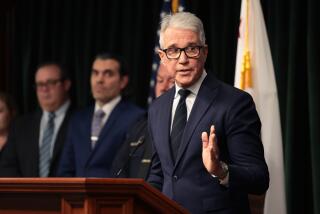Settlement Is Reached in SEC Trading Suit : * Securities: A paging firm’s ex-president has agreed to give up $736,935 in profits to settle charges that he manipulated the company’s stock.
- Share via
The former president of a Santa Ana paging company has agreed to give up $736,935 in profits made in securities trading to settle civil charges that he manipulated the company’s stock, the Securities and Exchange Commission said Tuesday.
Ahmad Bayaa also agreed to resign as president of Southland Communications Inc., to pay $137,248 in interest fees and place his 921,000 shares in company stock in a custodial account over which he will have no control, said Daniel R. Schnipper, SEC senior counsel in New York.
“We received the total amount, all the relief we sought in the lawsuit,” Schnipper said. “It is a disgorgement of ill-gotten gains.”
Under the settlement, Bayaa will be barred for 18 months from serving as a director or officer of any publicly traded company. Although he admitted no wrongdoing in the settlement, Bayaa also agreed not to violate securities laws in the future, Schnipper said.
Bayaa did not return calls seeking comment Tuesday. But Robert Rieders, a lawyer for Bayaa, disputed the SEC official’s use of the term “ill-gotten gains,” noting that the settlement document did not contain that phrase.
Bayaa resigned as president Jan. 17 but remains an employee of Southland Communications, which does business as National Paging. Philip J. Scalzo, who replaced Bayaa, could not be reached for comment. The company has not disclosed Bayaa’s current job title.
The settlement ends a lawsuit filed by the SEC in May, 1990, that accused Bayaa and five others of scheming to corner 83% of Southland Communications stock and manipulate the company’s share price for their own purposes. At the time, Schnipper described the case as “about as rare as a Tyrannosaurus Rex walking through Greenwich Village.”
While Southland Communications was reporting severe financial problems in the spring of 1990, its stock price inexplicably rose from $8.75 a share to $16.75 between March 13 and April 3. Southland issued press releases saying it knew of no reason for the unusual activity in its stock. The SEC halted trading on April 4, 1990.
More to Read
Inside the business of entertainment
The Wide Shot brings you news, analysis and insights on everything from streaming wars to production — and what it all means for the future.
You may occasionally receive promotional content from the Los Angeles Times.










